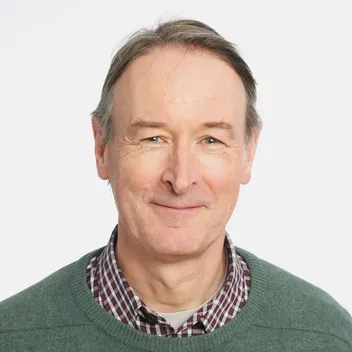
Contact
Research
John Hayes received his undergraduate training (1972-1976) in the School of Biological Sciences at the University of Edinburgh, with final year of studies in Molecular Biology. He gained a PhD from the Medical School of the same university in 1980, awarded for investigation into bile acid-binding by glutathione S-transferase (GST) enzymes, which was undertaken in the laboratory of Professor Iain Percy-Robb. Upon completion of his PhD experimental work, he worked for 14 months as a NHS basic-grade biochemist in the Department of Clinical Chemistry at the Western General Hospital in Edinburgh.
In 1981, Dr Hayes was appointed a Lecturer within the Department of Clinical Chemistry at the University of Edinburgh. Here, he focused research efforts on purification and characterization of human and rodent GST isoenzymes. One goal was to establish the substrate specificity and antioxidant activity of different isoenzymes. Another goal was to use protein chemistry and immunochemical methods to establish the genetic relationships of different isoenzymes: it has subsequently been shown that there are two distinct GST supergene families, each comprising between six and twenty genes. Through raising antibodies against individual isoenzymes, the laboratory identified previously unrecognised inducible GST, some of which could protect against hepatocarcinogenesis caused by exposure to aflatoxin B1.
In 1991, Dr Hayes took sabbatical leave from the University of Edinburgh to work in the laboratory of Dr Cecil Pickett, Merck Frosst, Montreal, Canada. Of note, around this time, the Pickett laboratory discovered the antioxidant response element (ARE) sequence in the promoters of GST and quinone reductase (NQO1) genes, and demonstrated the ARE sequence allows GST and NQO1 genes to be induced by agents that protect against chemical carcinogenesis.
In October 1992, Dr Hayes moved as a Reader to the University of Dundee where he undertook research into regulation of drug-metabolising enzymes and identified a previously unrecognized family of aldo-keto reductase (AKR) genes. In January 1997, the University of Dundee promoted him to a personal chair. Since then, his interest in the mechanisms by which gene expression is induced via ARE sequences by agents that protect against carcinogenesis has continued. Through collaborations with Professor Masayuki Yamamoto (Japan) this line of investigation led to the discovery that transcription factor NF-E2 p45-related factor 2 (NRF2) regulates both basal and inducible expression of genes encoding GST, AKR, NQO1, glutathione biosynthetic enzymes and components of the thioredoxin antioxidant system, which collectively provide protection against oxidative stress. Furthermore, his lab was the first to demonstrate that induction of genes regulated via ARE sequences requires stabilisation of NRF2 protein, which is inherently very unstable, through antagonism of the E3 cullin-3 RING ligase substrate adaptor Kelch-like ECH-associated protein 1 (KEAP1). Besides KEAP1, the Hayes lab, in collaboration with Professor Antonio Cuadrado (Spain), also discovered a separate pathway that regulates NRF2 via ubiquitylation, which involves beta-transducin repeat-containing protein (beta-TrCP), and is dependent on prior phosphorylation of NRF2 by glycogen synthase kinase-3 GSK-3).
Ongoing research in the Hayes laboratory has revealed that pharmacological activation of NRF2 robustly stimulates endogenous antioxidant systems. In the context of liver disease, loss of NRF2 in pre-clinical models markedly increases sensitivity to non-alcoholic steatohepatitis and cirrhosis. Moreover, pharmacological activation of NRF2 in pre-clinical models protects against non-alcoholic steatohepatitis and cirrhosis by suppressing inflammation and liver fibrosis. Activation of NRF2 also blunts gluconeogenesis and lipid biosynthesis, whilst promoting catabolism of fatty acids.
Prof Hayes has been a scientific advisor to the Medical Research Council and the Association for International Cancer Research. He has been a scientific advisor and served on the editorial boards of international scientific journals, including the Biochemical Journal, Carcinogenesis, Molecular & Cellular Biology, and the Journal of Pharmacology & Experimental Therapeutics.
Prof Hayes was elected a Fellow of the Royal Society of Edinburgh in May 2008, and a Fellow of the Society of Biology in September 2008.
Teaching
Prof Hayes contributes to the BMSc course run for medical undergraduate students on diabetes by providing lectures/tutorials on “Hepatocyte redox status” and “Endoplasmic reticulum stress in non-alcoholic steatohepatitis”.